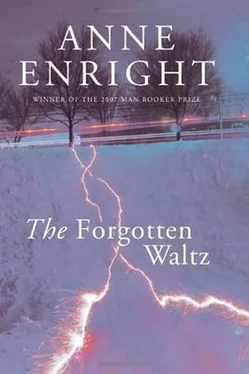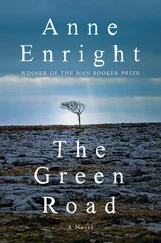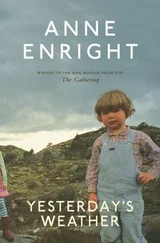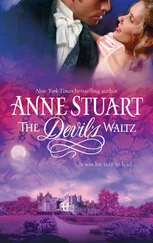‘You know what you want?’ I say.
Evie heads straight for a bank of foundation, picks one about two shades too pale, and she plies the brush, really working it in. I wonder what bedroom rituals led to all this expertise – I suspect Paddy’s dread hand – as she refuses highlighter, blusher, bronzer, to go for powder that is paler yet, and thick eyeliner.
‘Fabulous,’ I say.
All this while I try two different foundations, same shade, different texture, one on either cheek.
She selects an eyeshadow of deepest purple because, she says, it will make her eye colour ‘pop’.
I never know whether Evie will be good-looking. I squint a bit, trying to guess how she might morph over the years; the nose a bit stronger, the chin firmer. But I can’t hold it: her changing features drift away from each other and her future face falls apart.
All children are beautiful: the thing they do with their eyes that seems so dazzling when they take you all in, or seem to take you all in; it’s like being looked at by an alien, or a cat – who knows what they see? So Evie is beautiful because she is a child, but she is pretty ordinary looking too. The make-up brings it out in her – perhaps for the first time – her cheekbones will never be up to much, I think, and the nose is a bit of a blob. Though she still has those lovely, watchful eyes.
‘Is Megan into make-up?’ I say.
‘What?’
‘Megan. My niece.’
She doesn’t answer. Perhaps the relationships are too hard for her to draw. Then she says, ‘Actually Megan’s really into manga at the minute.’
‘Don’t do that,’ I say. She has unscrewed a lipstick that is so purple it is almost black.
‘No?’
‘No.’
‘Why not?’ Because your father will kill me .
‘They might have cold sores.’
She looks me in the eye. ‘No they won’t!’
She is suddenly, immediately, spoiling for a fight. I have a glimpse of what her mother has to put up with these days – only I get the opposite. I get it flipped into:
You’re not my mother!
Such violent emotion. And I have no reply.
She is quite correct: it was a stupid thing to say, and I am not her mother. I have no rights here. I can not mirror her mood, or throw it back at her. I see the next few years of my life, just taking whatever she wants to sling at me; a mute receptacle for her hate.
I say, ‘Wow, blue mascara.’
Evie puts the lipstick down.
‘Where?’
I slip off and buy the eyeliner for her – as a bribe, I suppose (more blood money), but it works. She is delighted. Evie was always easy to please and adolescence has not changed that. She scrubs off most of the make-up – ‘It always looks better after you’ve slept in it,’ I say – and we walk back to Dawson Street talking about tattoos, ear piercing, hair dye and the number of points you need to get into veterinary these days.
‘Your Mum,’ I say, in a palliative way, at least once. Possibly twice. Maybe three times.
‘What does your Mum say?’
‘I’d ask your Mum about that.’
‘I don’t think your Mum would like it.’
The zombie wife is back.
It is freezing cold. I bring her into a coffee shop for takeout and realise, in the queue, that she is too young for coffee.
‘Sometimes I have peppermint tea.’
I think I used to drink coffee at her age, certainly tea – I might be wrong. My mother is dead so I have no one to put me right on this.
After much peering at labels and signs, Evie settles on a hot chocolate. She takes her purse out of her backpack, and roots in it for money.
‘No, you’re all right.’
I pay at the till, remembering the day Aileen emptied out their joint bank account – what fun that was. How did she rear such a clear-hearted girl?
It is strange to me that Evie does not remember herself as a child, and I do remember her: Evie in Fiona’s garden, Evie on the beach. It is like she is always giving herself away, and keeps so little back for herself.
I hand her the hot chocolate and take her bag, and because it looks so cold outside, we tuck ourselves in at a table, and talk about dogs.
Evie says that when her Dad was growing up, he had a red setter that would steal eggs and his mouth was so soft and gentle, he could bring one home without cracking the shell.
‘Really,’ I say.
There is something so formal about talking to children: you have to be very polite. It is the only thing they understand.
‘Do you know how to train a guard dog?’ she says.
‘No, I don’t actually. Do you?’
Evie is always correcting herself. This is because everything she says comes out in the wrong order.
‘When my Dad was little and they had a dog. Somebody had a dog and they locked it in the boot of a car. And on the first day they passed the boot and the dog barked and on the second day they tapped on the boot and the dog went crazy and on maybe the fourth day-’
‘Four days?’ I say.
‘I know,’ she says. ‘On the fourth day the dog was completely silent and they opened the boot.’
Then she starts again.
‘No, the new owner of the dog. If you want the dog to change owners. Because a guard dog is trained to protect just one person and attack anyone else. So they give the new owner a piece of meat and he has to go up and open the boot.’
‘Jesus.’
‘And the dog can hardly see or anything because he’s been in the dark, and he just takes the meat, and he licks your hand, and then the dog loves you for the rest of his life.’
‘He told you this?’
‘Yes.’
‘Your father?’ I said.
‘What?’
‘Did your father do this to a dog?’
‘When he was growing up.’
‘Who locked the dog in the boot?’
‘I don’t know who did it,’ she says.
I look at this child and think about the days and weeks, the months of my life I have spent waiting for her father to call me. Is this something she should know?
I want to tell her that I sat outside her house in the dark one night, hanging on to the steering wheel, while she slept sixty feet away. I imagined her father behind those stone walls, I could not move for the intensity of my imagining: Seán in one place or another, doing something, or another thing, that was hard to sense or describe. I spent hours willing myself into him. And, you know, he might not even have been there.
‘So, give me some more dogs,’ I say.
‘My Dad?’
‘Yeah. Why not?’
‘His Mum had a springer spaniel and he ran out under a car and she said she was too sad ever to get another one ever again.’
‘Your Gran?’
‘My Nana.’
‘Right. Do you like your Nana?’
‘What?’
Seán would kill me, if he heard me ask her this. It is a great violation and I really quite enjoy it. I don’t know what I am stealing, but it is candy from a baby, I know that.
‘I mean what is she like, your Nana?’
‘My Nana?’
‘Is she a bit mean?’
‘What?’
And I want to lean across the little table and say, ‘Your father is not the man you think he is.’
I don’t of course, I say, ‘How’s the hot chocolate?’
‘Mmmn.’
There is no need to tell Evie about her father. She knows him better than anyone, because she loves him better than anyone. The facts about him – his kisses and his lies, his charm and his misdeeds – what are they to Evie?
What are they to me?
I say, ‘I remember you when you were just a little thing.’
‘Yeah?’
‘Long before your father and me. I mean long before anything. You were just.’
‘What was I like?’
I look at her. Seán’s pupils are ringed with a gold so pale it is nearly white. In Evie’s, the grey gives way to a burst of amber, quite intense.
Читать дальше












